人教版九年级英语上册知识点总结全集
(精)最新人教版九年级英语上册知识点总结(史上最全)

(精)最新人教版九年级英语上册知识点总
结(史上最全)
本文档旨在为九年级学生提供对最新人教版九年级英语上册知识点的全面总结。
以下是本文档的内容:
单元一:Greetings and Introductions
- 研究如何用英语进行问候和自我介绍
- 了解常见的礼貌用语和日常交际用语
单元二:School Life
- 研究关于学校生活的词汇,如课程、学科、教师等
- 了解并使用表达日常研究活动的动词短语
单元三:Hobbies and Interests
- 研究如何谈论自己的爱好和兴趣
- 掌握相关的动词短语和形容词
单元四:Health and Fitness
- 研究健康和健身方面的词汇和表达方式
- 探讨如何保持健康的生活方式和饮食惯
单元五:Technology and Media
- 研究与科技和媒体相关的词汇和表达方式
- 了解新闻报道和广告的语言特点
单元六:Travel and Tourism
- 研究旅行和旅游方面的词汇和表达方式
- 掌握询问和给予旅行信息的技巧
单元七:Global Citizenship
- 研究全球公民意识的相关词汇和概念
- 探讨全球问题,并提出自己的观点和解决方案
单元八:Jobs and Careers
- 研究与职业相关的词汇和表达方式
- 探索不同的职业选择和求职技巧
以上是最新人教版九年级英语上册的知识点总结,希望对九年级的学生们有所帮助。
人教版初三上英语知识点
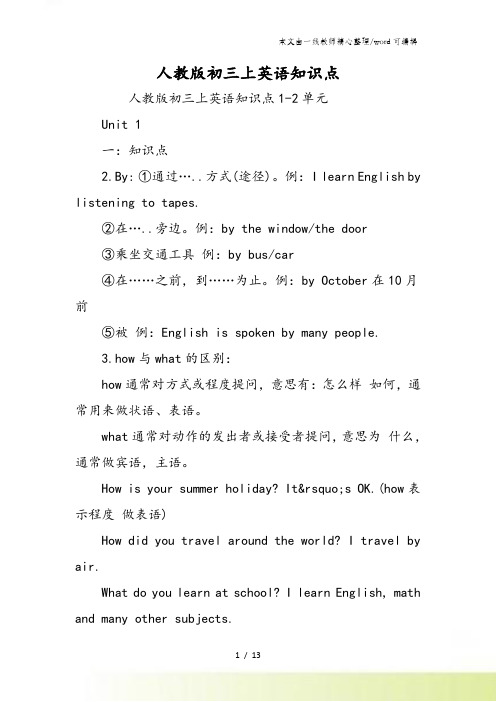
人教版初三上英语知识点人教版初三上英语知识点1-2单元Unit 1一:知识点2.By: ①通过…..方式(途径)。
例:I learn English by listening to tapes.②在…..旁边。
例:by the window/the door③乘坐交通工具例:by bus/car④在……之前,到……为止。
例:by October在10月前⑤被例:English is spoken by many people.3.how与what的区别:how通常对方式或程度提问,意思有:怎么样如何,通常用来做状语、表语。
what通常对动作的发出者或接受者提问,意思为什么,通常做宾语,主语。
How is your summer holiday? It’s OK.(how表示程度做表语)How did you travel around the world? I travel by air.What do you learn at school? I learn English, math and many other subjects.4.aloud, loud ,loudly 均可做副词。
aloud 出声地大声地多与read 、speak连用例如:read aloud 朗读 speak aloud说出声来loud 大声地响亮地 loudly 高声地多指喧闹声和不悦耳的声音。
5. voice 指人的嗓音也指鸟鸣。
sound 指人可以听到的各种声音。
noise 指噪音、吵闹声6. find + 宾语 + 宾补(名词形容词介词短语分词等)例:I find him friendly. I found him working in the garden.We found him in bed. He found the window closed.7. 常见的系动词有:①是:am 、is、are ②保持:keep、 stay③ 转变:become、 get、turn ④ ……起来 feel、look、 smell、 taste、 sound8. get + 宾语 + 宾补(形容词过去分词动词不定式) 使某种情况发生例:Get the shoes clean. 把鞋擦干净 Get Mr. Green to come. 让格林先生进来I want to get my bike repaired. 我想去修自行车You can’t get him waiting. 你不能让他老等着9. 动词不定式做定语①与所修饰的名词构成主谓关系The next train to arrive was from New York. He is always the first to come.②与所修饰的名词构成动宾关系I have nothing to say. I need a pen to write with.I need some paper to write on. I don’t havea room to live in.10. practice , fun 做名词为不可数名词 11. add 补充说又说12. join 加入某团体并成为其中一员 attend 出席参加会议或讲座join in与take part in指参加到某项活动中去。
人教版九年级英语上册各单元知识点汇总

人教版九年级英语上册各单元知识点汇总UNIT1 How can we become good learners?SectionA重点单词听,并跟读下列单词l. textbook n.教科书;课本2. conversation n.交谈;谈话3. aloud adv.大声地;出声地4. pronunciation n.发音;读音5. sentence n.句子6. patient adj.有耐心的n.病人7. expression n.表情;表示;表达方式8. discover v.发现;发觉9. secret n.秘密;秘诀adj.秘密的;保密的10. grammar n.语法l1. repeat v.重复;重做l2. note n.笔记;记录v.注意;指出13. pal n.朋友;伙伴14. chemistry n.化学15. memorize v.记忆;记住16. pattern n.模式;方式听,并跟读下列单词变形。
l. conversation —converse (v.会话)2. patient —patience (n.耐心)3. expression —express (v.表达)1. discover —discovery ( n.发现)5. improve —improvement( n.改善)重点短语听,并跟读下列短语。
l. make word cards 制作单词卡片2. ask sb. for ... 向某人寻求……3. have conversations with sb. 和某人谈话4. at first 起初, 起先5. give a report 做报告6. take notes 记/做笔记7. word by word 逐词地8. so... that 如此……以至于9. write e-mails to sb. 给某人写电子邮件10. be afraid to do sth. /be afraid of doing sth.害怕做某事11. because of 由于;因为12. fall in love with 爱上13. a piece of cake 小菜一碟14. look up( 在词典、参考书中或通过电脑)查阅;抬头看15. so that 以便重点句型听,并跟读下列句子。
(完整)人教版九年级英语(上)知识点归纳,推荐文档
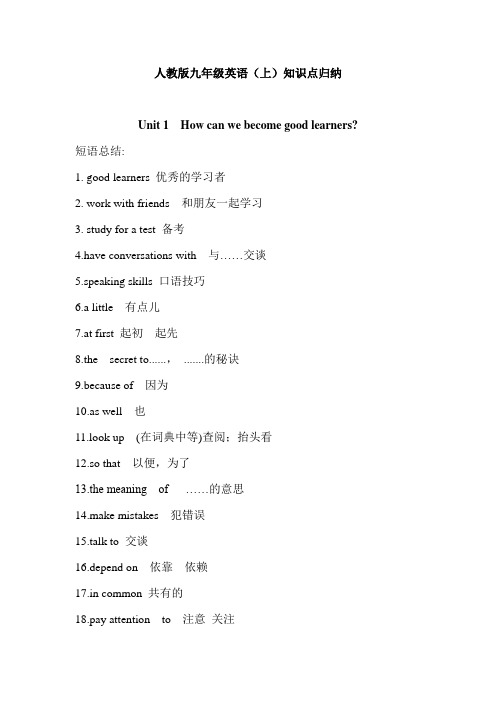
人教版九年级英语(上)知识点归纳Unit 1 How can we become good learners? 短语总结:1. good learners 优秀的学习者2. work with friends 和朋友一起学习3. study for a test 备考4.have conversations with 与……交谈5.speaking skills 口语技巧6.a little 有点儿7.at first 起初起先8.the secret to......,.......的秘诀9.because of 因为10.as well 也11.look up (在词典中等)查阅;抬头看12.so that 以便,为了13.the meaning of ……的意思14.make mistakes 犯错误15.talk to 交谈16.depend on 依靠依赖17.in common 共有的18.pay attention to 注意关注19.connect ……with ……把……联系。
20.for example 例如21.think about 考虑22.even if 即使尽管纵容23.look for 寻找24.worry about 担心担忧25.make word cards 制作单词卡片26.ask the teacher for help 向老师求助27.read aloud 大声读28.spoken english 英语口语29.give a report 作报告30.word by word 一字一字地31.so……that 如此……以至于32.fall in love with 爱上33.something interesting 有趣的事情34.take notes 记笔记35.how often 多久一次36.a lot of 许多37.the ability to do sth. 做某事的能力38.learning habits 学习习惯39.be interested in 对……感兴趣40.get bored 感到无聊41.be good at 在……方面擅长42.be afraid of 害怕43.each other 彼此互相44.instead of 代替而不是二.用法集萃1. by doing sth 通过做某事2.it +be+adj+to do sth 做某事是……的3.finish doing sth 完成某事4.what about doing sth?做某事怎么样?5.try to do sth 尽力做某事6.the +比较近,the+比较近越……,就越……7.find it+adj+to do sth 发现做某事8.be afraid of doing sth 害怕做某事9.help sb (to) do sth 帮助某人做某事10.practice doing sth 练习做某事11.keep doing sth 一直做某事12.be afraid to do sth 害怕做某事13.begin to do sth 开始做某事14.want to do sth 想要做某事15.need to do sth 需要做某事16.remember to do sth 记得做某事17.shoot 射(射着,射死等表结果)18.shoot at(瞄准)射Unit1 检测题一.单项选择1.—_______ do you study English? —By listening to tapes.A. HowB. WhereC. WhenD. Why2.You can improve your English practicing more.A.byB.withC.ofD.in3. Why not practice your _________English in _________ English-speaking country?A. speaking, aB. speaking, anC. spoken, an4. ________conversations with others is one of the secrets to _________a successful learner.A. Practice, becomeB. Practice, becomingC. Practicing, becoming5 ---There‘re a few new words in the article? ---What about _________in your dictionary?A. looking it upB. looking up itC. looking them up6. We‘ll go out to play _________ it rains tomorrow.A. soB. unlessC. because7. Can you ________which is the right answer to the question?A. look forB. findC. find out8. Jenny used to be afraid to ________in class, so she always________nothing.A. speak, talkedB. speak, saidC. say, spoke9.— Why not listen to BBC news to improve your listening skills?—It‘s ________ difficult _______ I can‘t follow. A. too; to B. so; thatC. such; that10. A good learner often thinks about ________he needs to practice more.A. thatB. whatC. how11.--I‘m going to listen _______the tape. --OK. Remember to listen ________the key words.A. to, toB. to ,forC. for, to12. ________or not you can learn well depends on your learning habits.A. IfB. WeatherC. Whether13. I have finished _________my report. May I start to learn ________the guitar?A. writing, playingB. writing, to playC. to write, playing14. ---I often make mistakes _______grammar. ---Why not ask your teacher _______help?A. in, toB. in, forC. at, to15. _________write down the new words in your notebook?A. Would you likeB. How aboutC. Could you please16. ---Jack used to have ________writing practice. ---Yes, and he had learned _________.A. a lot of, a lot ofB. a lot of, a lotC. a lot, a lot of17. The more careful you are, ________mistakes you‘ll make.A. fewerB. the fewerC. the less18. Goo d learners aren‘t afraid _______mistakes. Instead, they learn ________mistakes.A. of making, inB. to make, fromC. to make, in19. For the first time, pay attention _________quickly to get the main ideas.A. to readB. readingC. to reading20.I discovered that listening to is the secret language learning. A.something intresting, to B.interesting something, toC.something interested, ofD.interested something of21.Jenny found it very easy English well.A.learningB.to learnC.learnD.learned22. He_____ with the girl with golden hair and will soon get married____ her.A. falls in love; toB. is in love; toC. loves; withD. loves; to23. My father thinks _____ is a great way to learn English.A. study grammar.B. I study grammar.C. studying grammar.D. studies grammar24 Why not ___ your teacher for help when you can‘t finish _____ it byyourself?A. ask; writeB. to ask; writingC. ask; writingD. asking; write25. I wonder if I can learn English well.—. All things are difficult before they are easy.A. I am afraid soB. You‘re slowC. It takes timeD. It‘s a piece of cake26 You‘ll find _____________ easy to learn it well. A. that B. its C. itD. this27. –I don‘t have a partner to practice English ______________.---Why not join an English language club to practice _______________?A. /; speakingB. with; to speakC. /; to speakD. with; speaking28. ---She hardly makes mistakes _________English grammar.---No, it seems that she was born ________the ability to learn languages.A. in, withB. with, inC. in, inD. with, with二用所给单词的适当形式填空。
最新人教版九年级英语上册单元知识归纳全册
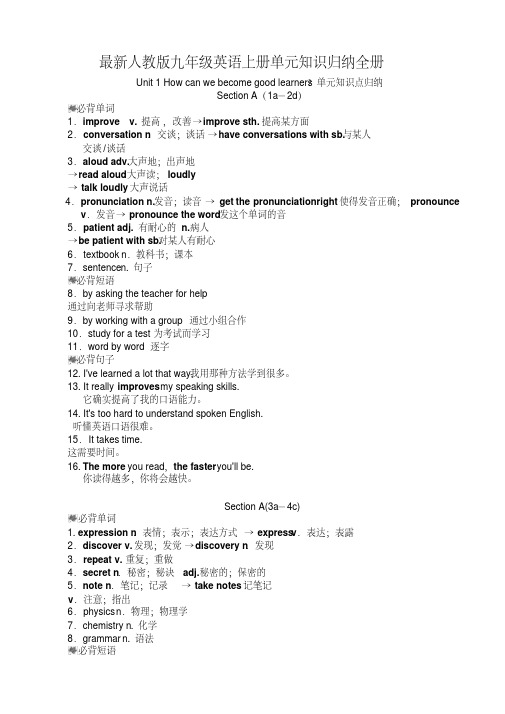
最新人教版九年级英语上册单元知识归纳全册Unit 1 How can we become good learners?单元知识点归纳Section A(1a-2d)必背单词1.improve v. 提高,改善→improve sth. 提高某方面2.conversation n.交谈;谈话→have conversations with sb. 与某人交谈/谈话3.aloud adv.大声地;出声地→read aloud大声读;loudly→ talk loudly大声说话4.pronunciation n.发音;读音→ get the pronunciationright使得发音正确;pronounce v.发音→ pronounce the word发这个单词的音5.patient adj. 有耐心的n.病人→be patient with sb.对某人有耐心6.textbook n.教科书;课本7.sentence n. 句子必背短语8.by asking the teacher for help通过向老师寻求帮助9.by working with a group 通过小组合作10.study for a test 为考试而学习11.word by word 逐字必背句子12. I've learned a lot that way.我用那种方法学到很多。
13. It really improves my speaking skills.它确实提高了我的口语能力。
14. It's too hard to understand spoken English.听懂英语口语很难。
15.It takes time.这需要时间。
16. The more you read,the faster you'll be.你读得越多,你将会越快。
Section A(3a-4c)必背单词1. expression n.表情;表示;表达方式→ express v.表达;表露2.discover v. 发现;发觉→discovery n.发现3.repeat v. 重复;重做4.secret n.秘密;秘诀adj.秘密的;保密的5.note n.笔记;记录→ take notes 记笔记v.注意;指出6.physics n.物理;物理学7.chemistry n. 化学8.grammar n. 语法必背短语9.be afraid to害怕10. fall in love with 爱上……11.look up (在词典或参考书中)查阅;抬头看→look it up12. because of因为必背句子13.The teacher spoke so q uickly that I did not understand her most of the time.老师说得太快,以至于很多时候我都听不懂。
人教版初三英语上册知识点汇总

九年级英语上册知识点汇总Unit1 The Changing World Topic1 Our country has developed rapidly.【短语和句型归纳】1.have a good summer holiday暑假过得愉快e back from从......回来3.have/has been to去过4.have/has gone to去了5.not...any more再也不...6.take photos照相7.by the way顺便问一下8.take part in参加9.around/all over/throughout the world全世界10.tell sb.something about...告诉某人关于某事11.have/live a happy/hard life过着幸福/艰苦的生活12.describe...in detail详细描述13.give support to支持...14.see...oneself亲眼看见15.keep in touch with与...保持联系16.far away遥远的17.kinds/sorts of各种各样的...18.not only...but also不仅...而且...19.make progress取得进步20.more than/over多于21.develop/improve rapidly迅速发展/改善22.tell sb.(not)to do sth.告诉某人(别)做某事23.ask sb.(not)to do sth.要求某人(别)做某事24.in order to do sth.为了做某事25.have to do sth.不得不做某事26.It s+形容词+for sb.to do sth.对于某人来说做某事是...的27.why not do sth.为什么不做某事28.succeed/be successful in doing sth.成功地做某事29.dream about doing sth.梦想做某事30.see/hear sb.do/doing sth.看见/听见某人做/正在做某事【语法点归纳】现在完成时一.现在完成时的基本结构肯定句:主语+have/has+动词的过去分词+其他否定句:主语+have/has+not+动词的过去分词+其他一般疑问句:Have/Has+主语+动词的过去分词+其他特殊疑问句:特殊疑问词+一般疑问句(have/has+主语+过去分词+其他)二.现在完成时的用法1.现在完成时用来表示过去已经完成的动作对现在造成影响或后果。
人教版初三英语第一单元知识点
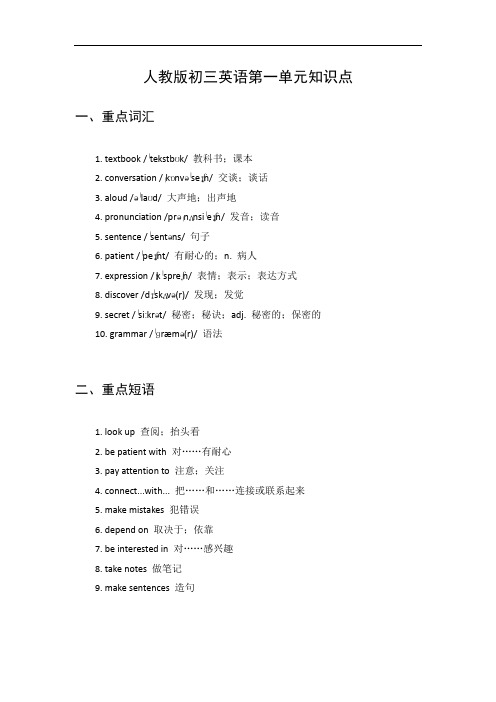
人教版初三英语第一单元知识点一、重点词汇1. textbook /ˈtekstbʊk/ 教科书;课本2. conversation /ˌkɒnvəˈseɪʃn/ 交谈;谈话3. aloud /əˈlaʊd/ 大声地;出声地4. pronunciation /prəˌnʌnsiˈeɪʃn/ 发音;读音5. sentence /ˈsentəns/ 句子6. patient /ˈpeɪʃnt/ 有耐心的;n. 病人7. expression /ɪkˈspreʃn/ 表情;表示;表达方式8. discover /dɪˈskʌvə(r)/ 发现;发觉9. secret /ˈsiːkrət/ 秘密;秘诀;adj. 秘密的;保密的10. grammar /ˈɡræmə(r)/ 语法二、重点短语1. look up 查阅;抬头看2. be patient with 对……有耐心3. pay attention to 注意;关注4. connect...with... 把……和……连接或联系起来5. make mistakes 犯错误6. depend on 取决于;依靠7. be interested in 对……感兴趣8. take notes 做笔记9. make sentences 造句三、重点句型1. —How do you study for a test? 你是怎样为考试而学习的?—I study by working with a group. 我通过和小组一起学习。
2. It's too hard to understand spoken English. 听懂英语口语太难了。
3. The more you read, the faster you'll be. 你读得越多,你就会读得越快。
4. Why did Wei Fen find it difficult to learn English? 为什么魏芬觉得学英语很难?5. I was afraid to ask questions because of my poor pronunciation. 因为我的发音不好,我害怕问问题。
人教版九年级英语上册各单元知识点归纳总结
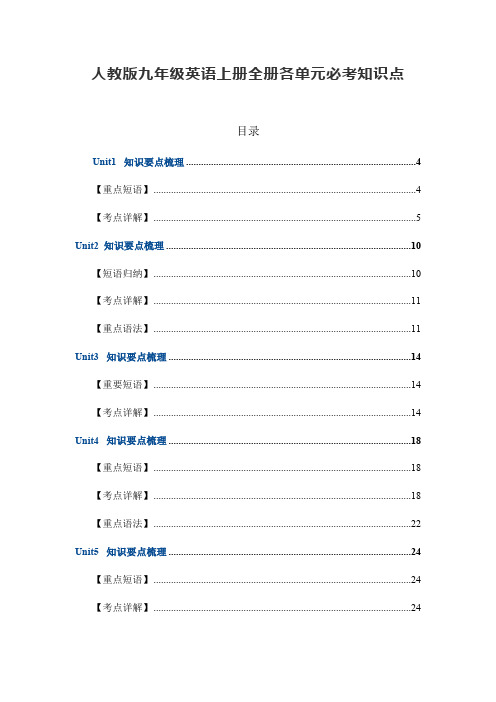
人教版九年级英语上册全册各单元必考知识点目录Unit1 知识要点梳理 (4)【重点短语】 (4)【考点详解】 (5)Unit2 知识要点梳理 (10)【短语归纳】 (10)【考点详解】 (11)【重点语法】 (11)Unit3 知识要点梳理 (14)【重要短语】 (14)【考点详解】 (14)Unit4 知识要点梳理 (18)【重点短语】 (18)【考点详解】 (18)【重点语法】 (22)Unit5 知识要点梳理 (24)【重点短语】 (24)【考点详解】 (24)【重点语法】 (27)Unit6 知识要点梳理 (30)【重点短语】 (30)【考点详解】 (30)【重点语法】 (33)Unit1 知识要点梳理【重点短语】1. have conversation with sb. 同某人谈话2. too…to… 太……而不能3. the secret to… ……的秘诀4. be afraid of doing sth./ be afraid to do sth. 害怕做某事5. look up 查阅6. repeat out loud 大声跟读7. make mistakes in 在……方面犯错误8. connect ……with… 把……和……连接/联系起来9. get bored 感到厌烦10. be stressed out 焦虑不安的11. pay attention to 注意;关注12. depend on 取决于;依靠13. the ability to do sth.. 做某事的能力【考点详解】1. by + doing 通过……方式(by是介词,后面要跟动名词,也就是动词的ing 形式)2. talk about 谈论,议论,讨论The students often talk about movie after class. 学生们常常在课后讨论电影。
talk to sb= talk with sb 与某人说话3. 提建议的句子:①What/ how about +doing sth.? 做…怎么样?(about后面要用动词的ing形式,这一点考试考的比较多)如:What/ How about going shopping?②Why don't you + do sth.? 你为什么不做…?如:Why don't you go shopping?③Why not + do sth. ? 为什么不做…?如:Why not go shopping?④Let's + do sth. 让我们做…...吧。
人教版九年级英语上册重点短语及考点归纳
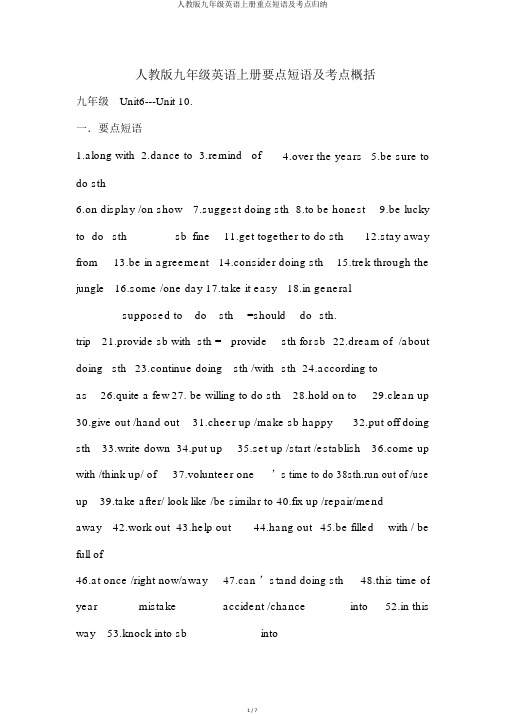
人教版九年级英语上册要点短语及考点概括九年级Unit6---Unit 10.一.要点短语1.along with2.dance to3.remind of4.over the years5.be sure to do sth6.on display /on show7.suggest doing sth8.to be honest9.be lucky to do sth sb fine 11.get together to do sth 12.stay away from 13.be in agreement 14.consider doing sth 15.trek through the jungle 16.some /one day 17.take it easy 18.in generalsupposed to do sth =should do sth.trip 21.provide sb with sth = provide sth for sb 22.dream of /about doing sth 23.continue doing sth /with sth 24.according toas 26.quite a few 27. be willing to do sth 28.hold on to 29.clean up 30.give out /hand out 31.cheer up /make sb happy 32.put off doing sth 33.write down 34.put up 35.set up /start /establish e up with /think up/ of 37.volunteer one ’s time to do 38sth.run out of /use up 39.take after/ look like /be similar to 40.fix up /repair/mendaway 42.work out 43.help out 44.hang out 45.be filled with / be full of46.at once /right now/away 47.can ’s t and doing sth 48.this time of year mistake accident /chance into 52.in this way 53.knock into sb into55.since then 56.in history 57.at college 58.by the time 59.get into /get out of 60.go off 61.wait for sb to do sth 62.run off totime /in time e by 65.give sb a ride 66.break down/get dressed in 68.show up 69.set off70.flee from/ escape from 71.sell out二、考点概括考点 1.重申换词时,要用do / does / did +动词原形。
人教版九年级英语上册知识点总结全集
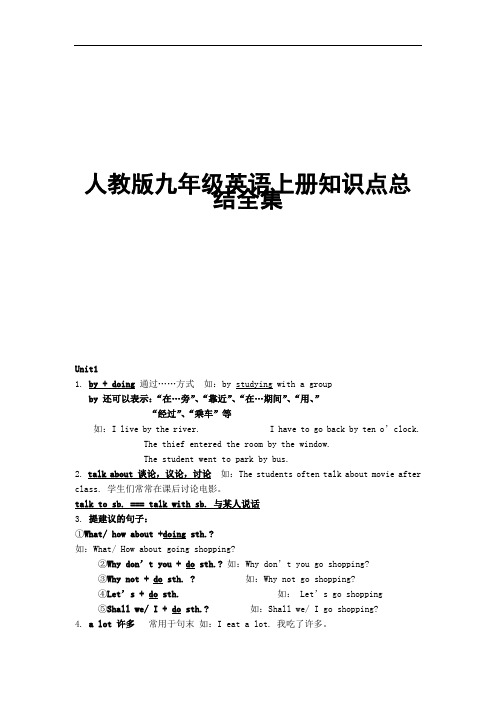
人教版九年级英语上册知识点总结全集Unit11. by + doing通过……方式如:by studying with a groupby 还可以表示:“在…旁”、“靠近”、“在…期间”、“用、”“经过”、“乘车”等如:I live by the river. I have to go back by ten o’clock.The thief entered the room by the window.The student went to park by bus.2. talk about 谈论,议论,讨论如:The students often talk about movie after class. 学生们常常在课后讨论电影。
talk to sb. === talk with sb. 与某人说话3. 提建议的句子:①What/ how about +doing sth.?如:What/ How about going shopping?②Why don’t you + do sth.?如:Why don’t you go shopping?③Why not + do sth. ? 如:Why not go shopping?④Let’s + do sth. 如: Let’s go shopping⑤Shall we/ I + do sth.?如:Shall we/ I go shopping?4. a lot 许多常用于句末如:I eat a lot. 我吃了许多。
5. too…to 太…而不能常用的句型too+adj./adv. + to do sth.如:I’m too tired to say anything. 我太累了,什么都不想说。
6. aloud, loud与loudly的用法三个词都与"大声"或"响亮"有关。
①aloud是副词,重点在出声能让人听见,但声音不一定很大,常用在读书或说话上。
最新人教版英语九年级上册知识点总结(精华版)

最新人教版英语九年级上册知识点总结
(精华版)
本文档是对最新人教版英语九年级上册的知识点进行总结,旨在帮助学生进行复和备考。
以下是该教材的重点内容:
Unit 1: Great Scientists
- 本单元主要介绍了一些伟大的科学家及他们的贡献,包括爱因斯坦、居里夫人等。
- 重点词汇包括:genius、discover、theory等。
- 难点语法为现在完成时和一般过去时的用法。
Unit 2: Growing Pains
- 本单元主要围绕青少年成长中的问题展开,包括睡眠问题、沟通问题等。
- 重点词汇包括:believe、change、advice等。
- 难点语法为情态动词的用法。
Unit 3: Travel Journal
- 本单元通过旅行记述的方式,介绍了一些旅行经历和相关事宜。
- 重点词汇包括:impression、guide、tour等。
- 难点语法为过去进行时和过去完成时的用法。
Unit 4: Ancient Civilizations
- 本单元介绍了一些古代文明,包括埃及文明、中国古代文明等。
- 重点词汇包括:pyramid、philosophy、dynasty等。
- 难点语法为被动语态的用法。
Unit 5: Heroes
- 本单元以不同英雄人物为主题,介绍了一些英雄的事迹。
- 重点词汇包括:brave、rescue、inspire等。
- 难点语法为现在完成进行时的用法。
...
以上是最新人教版英语九年级上册的知识点总结,希望对你的研究有所帮助。
最全面人教版九年级上册英语各单元知识点总复习归纳总结

最全面人教版九年级上册英语各单元知识点总复习归纳总结Unit 1: Hello!- Greetings and introductions: Learn how to greet people and introduce yourself.- Numbers: Practice numbers and learn how to say and write them.- Personal information: Learn how to ask and answer questions about personal information like name, age, and nationality.Unit 2: How Do You Study for a Test?- Study methods: Learn different ways to study for tests and improve learning efficiency.- Time management: Understand the importance of time management in studying.- Test preparation: Learn strategies for preparing effectively for exams.- Giving advice: Practice giving and receiving study advice using modal verbs.Unit 3: What Are You Doing for Vacation?- Vacation plans: Learn how to talk about your plans for the vacation.- Leisure activities: Discuss different leisure activities and preferences.- Present continuous tense: Understand and use the present continuous tense to talk about present actions.- Future plans: Express future plans and intentions using "be going to" and present continuous tense.Unit 4: I Used to Be Afraid of the Dark.- Past experiences: Learn how to talk about past experiences using "used to" and simple past tense.- Phobias and fears: Discuss different phobias and fears people may have.- Narrative tenses: Understand and use narrative tenses to talk about past events.Unit 5: What is the highest mountain in the world?- Geography and landmarks: Learn about different geographical features and famous landmarks.- Describing places: Practice describing different places using adjectives.- Research skills: Learn how to conduct research and gather information about different topics.Unit 6: Why don't you get her a scarf?- Giving suggestions: Practice suggesting and responding to suggestions.- Gift ideas: Discuss different gift ideas for various occasions.- Buying clothes: Learn how to describe and buy clothes in a store.- Preferences: Express personal preferences and opinions using adjectives.Unit 7: Teenagers should be allowed to choose their own clothes.- Rules and regulations: Discuss rules and regulations for teenagers.- Arguments for and against: Present arguments for and against a given topic.- Writing an opinion article: Learn how to write an opinion article expressing personal views.- Persuasive language: Use persuasive language to convince others of a certain viewpoint.Unit 8: I'll help clean up the city parks.- Volunteering: Discuss different volunteer activities and their benefits.- Environmental issues: Learn about environmental problems and ways to address them.- Expressing willingness: Use "will" and "be willing to" to express willingness to help.- Making suggestions: Practice making suggestions on how to improve the environment.Unit 9: What does he look like?- Physical appearance: Learn vocabulary to describe people's physical appearance.- Personality traits: Discuss different personality traits and their impact on people's lives.- Describing people: Practice describing people using adjectives and sentence structures.- Role plays: Act out different scenarios and describe the characters involved.以上是最全面人教版九年级上册英语各单元知识点的总复习归纳总结。
人教版九年级英语全册各单元知识点总结
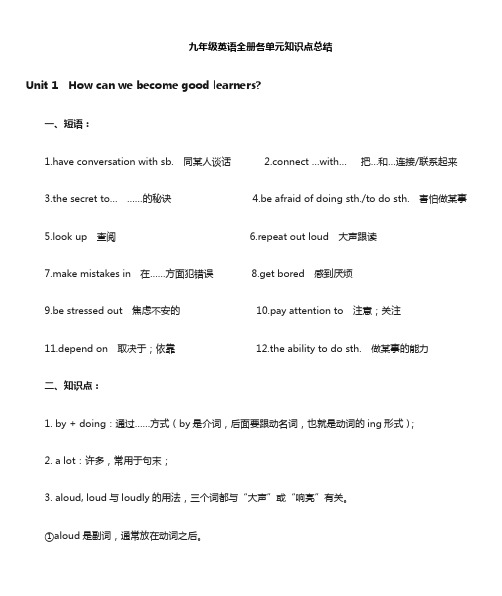
九年级英语全册各单元知识点总结Unit 1 How can we become good learners?一、短语:1.have conversation with sb. 同某人谈话2.connect …with… 把…和…连接/联系起来3.the secret to… ……的秘诀4.be afraid of doing sth./to do sth. 害怕做某事5.look up 查阅6.repeat out loud 大声跟读7.make mistakes in 在……方面犯错误8.get bored 感到厌烦9.be stressed out 焦虑不安的10.pay attention to 注意;关注11.depend on 取决于;依靠12.the ability to do sth. 做某事的能力二、知识点:1. by + doing:通过……方式(by是介词,后面要跟动名词,也就是动词的ing形式);2. a lot:许多,常用于句末;3. aloud, loud与loudly的用法,三个词都与“大声”或“响亮”有关。
①aloud是副词,通常放在动词之后。
②loud可作形容词或副词。
用作副词时,常与speak, talk, laugh等动词连用,多用于比较级,须放在动词之后。
③loudly是副词,与loud同义,有时两者可替换使用,可位于动词之前或之后。
4. not …at all:一点也不,根本不,not经常可以和助动词结合在一起,at all 则放在句尾;5. be / get excited about sth.:对…感到兴奋;6. end up doing sth:终止/结束做某事;end up with sth.:以…结束;7. first of all:首先(这个短语可用在作文中,使得文章有层次);8. make mistakes:犯错make a mistake 犯一个错误;9. laugh at sb.:笑话;取笑(某人)(常见短语)10. take notes:做笔记/记录;11. native speaker 说本国语的人;12. make up:组成、构成;13. deal with:处理、应付;14. perhaps = maybe:也许;15. go by:(时间)过去;16.each other:彼此;17.regard… as … :把…看作为…;18.change… into…:将…变为…;19. with the help of sb. = with one's help 在某人的帮助下(注意介词of和with,容易出题)20. compare … to …:把…比作… compare with 拿…和…作比较;21. instead:代替,用在句末,副词;instead of sth / doing sth:代替,而不是(这个地方考的较多的就是instead of doing sth,也就是说如果of后面跟动词时,要用动名词形式,也就是动词的ing形式)22.Shall we/ I + do sth.? 我们/我…好吗?23. too…to:太…而不能,常用的句型是too+形容词/副词+ to do sth.Unit 2 I think that moon cakes are delicious!一、短语:1. the Lantern Festival 元宵节2. the Dragon Boat Festival 端午节3. the Water Festival 泼水节4. remind sb. of 使某人想起5. eat five meals a day 一天吃五餐6. put on five pounds 体重增加了五磅7. treat sb. with. 用/以……对待某人8. be similar to... 与.......相似9. end up 最终成为/处于10. share sth. with sb. 与……分享……11. as a result结果12. one... the other... (两者中的) 一个…另一个…13. take sb. out for dinner 带某人出去吃饭14. dress up 乔装打扮15. haunted house 鬼屋16. the beginning of new life 新生命的开始二、知识点:1.宾语从句:(三大考点:引导词、时态和语序。
人教英语九年级上册知识点
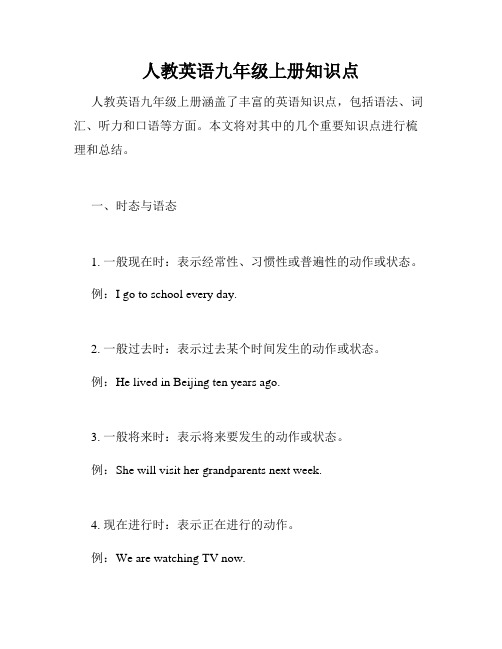
人教英语九年级上册知识点人教英语九年级上册涵盖了丰富的英语知识点,包括语法、词汇、听力和口语等方面。
本文将对其中的几个重要知识点进行梳理和总结。
一、时态与语态1. 一般现在时:表示经常性、习惯性或普遍性的动作或状态。
例:I go to school every day.2. 一般过去时:表示过去某个时间发生的动作或状态。
例:He lived in Beijing ten years ago.3. 一般将来时:表示将来要发生的动作或状态。
例:She will visit her grandparents next week.4. 现在进行时:表示正在进行的动作。
例:We are watching TV now.5. 现在完成时:表示过去发生的动作对现在造成的影响。
例:I have finished my homework.6. 被动语态:通过使用助动词be的不同形式来表示动作的承受者或者发出者。
例:The book was written by the famous writer.二、疑问句和否定句1. 疑问句:将助动词do/does/did提前于主语,动词用原形。
例:Do you like basketball?2. 否定句:在动词前面加上don't/doesn't/didn't。
例:She doesn't like coffee.三、连词与从句1. and:连接并列句。
例:I like apples and bananas.2. but:连接转折句。
例:He is tired, but he still keeps running.3. because:连接原因从句。
例:I didn't go to the party because I was busy.4. if:连接条件从句。
例:If it rains, we will stay at home.四、情态动词1. can:表示能力或许可。
人教版九年级上册英语各单元语法重点梳理
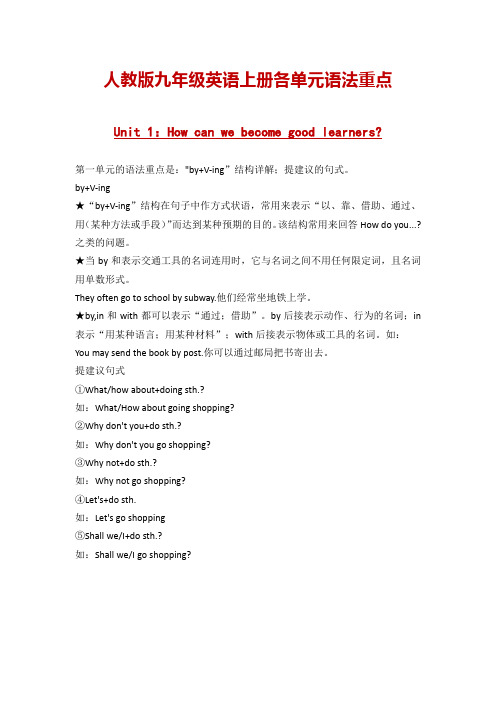
人教版九年级英语上册各单元语法重点Unit 1:How can we become good learners?第一单元的语法重点是:"by+V-ing”结构详解;提建议的句式。
by+V-ing★“by+V-ing”结构在句子中作方式状语,常用来表示“以、靠、借助、通过、用(某种方法或手段)”而达到某种预期的目的。
该结构常用来回答How do you...?之类的问题。
★当by和表示交通工具的名词连用时,它与名词之间不用任何限定词,且名词用单数形式。
They often go to school by subway.他们经常坐地铁上学。
★by,in和with都可以表示“通过;借助”。
by后接表示动作、行为的名词;in 表示“用某种语言;用某种材料”;with后接表示物体或工具的名词。
如:You may send the book by post.你可以通过邮局把书寄出去。
提建议句式①What/how about+doing sth.?如:What/How about going shopping?②Why don't you+do sth.?如:Why don't you go shopping?③Why not+do sth.?如:Why not go shopping?④Let's+do sth.如:Let's go shopping⑤Shall we/I+do sth.?如:Shall we/I go shopping?Unit 2:I think that mooncakes are delicious!第二单元的语法重点是:宾语从句;反义疑问句;表达“花费”。
宾语从句that,if和whatever引导的宾语从句:★宾语从句中连接词的选择1.由that引导的宾语从句:that在从句中无词义,不作任何成分,常可省略。
如:Jenny said(that)she could finish her painting before supper.I think(that)you are right.2.由if或whether引导的宾语从句:if或whether引导宾语从句时,一般可通用,都表示“是否”。
人教版九年级英语全册知识点归纳
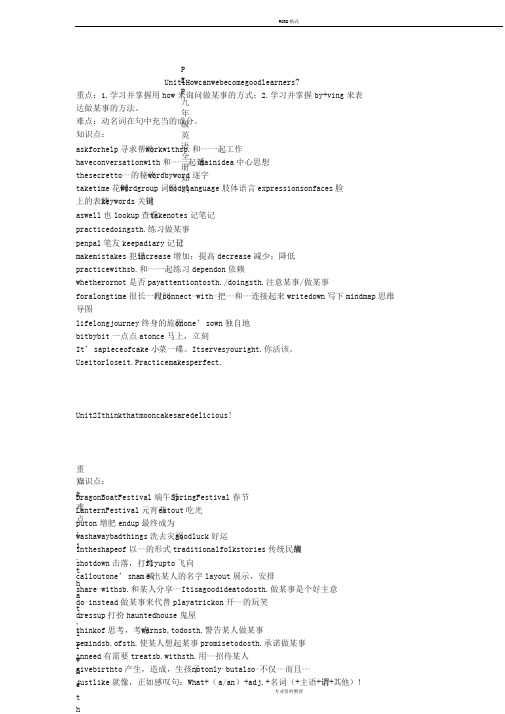
P E P 九年级英语全册知纳 Unit1Howcanwebecomegoodlearners? 重点:1.学习并掌握用how 来询问做某事的方式;2.学习并掌握by+ving 来表 达做某事的方法。
难点:动名词在句中充当的成分。
知识点: askforhelp 寻求帮助w orkwithsb.和⋯⋯一起工作 haveconversationwith 和⋯⋯一起对话mainidea 中心思想thesecretto ⋯⋯的秘诀w ordbyword 逐字 taketime 花时间w ordgroup 词组b odylanguage 肢体语言expressionsonfaces 脸上的表情k eywords 关键词aswell 也lookup 查看t akenotes 记笔记 practicedoingsth.练习做某事 penpal 笔友keepadiary 记日记makemistakes 犯错i ncrease 增加;提高decrease 减少;降低 practicewithsb.和⋯⋯一起练习dependon 依赖whetherornot 是否payattentiontosth./doingsth.注意某事/做某事foralongtime 很长一段时间c onnect ⋯with ⋯把⋯⋯和⋯⋯连接起来writedown 写下mindmap 思维导图lifelongjourney 终身的旅程o none ’sown 独自地 bitbybit 一点点atonce 马上,立刻It ’sapieceofcake 小.菜一碟。
Itservesyouright.你活该。
Useitorloseit.Practicemakesperfect.Unit2Ithinkthatmooncakesaredelicious!重点&难点:1.that,if知识点:DragonBoatFestival 端午节S pringFestival 春节 LanternFestival 元宵节e atout 吃光 puton 增肥endup 最终成为 washawaybadthings 洗去灾祸g oodluck 好运intheshapeof 以⋯⋯的形式traditionalfolkstories 传统民间故事 shotdown 击落,打垮f lyupto 飞向 calloutone ’snam 喊e 出某人的名字layout 展示,安排 share ⋯withsb.和某人分享⋯⋯Itisagoodideatodosth.做某事是个好主意 do ⋯instead 做某事来代替playatrickon 开⋯⋯的玩笑 dressup 打扮hauntedhouse 鬼屋 thinkof 思考,考虑w arnsb,todosth.警告某人做某事 remindsb.ofsth.使某人想起某事promisetodosth.承诺做某事1Unit3Couldyoupleasetellmewheretherestroomare?重点:学习并掌握wh-&how 所引导的宾语从句。
九年级上册英语
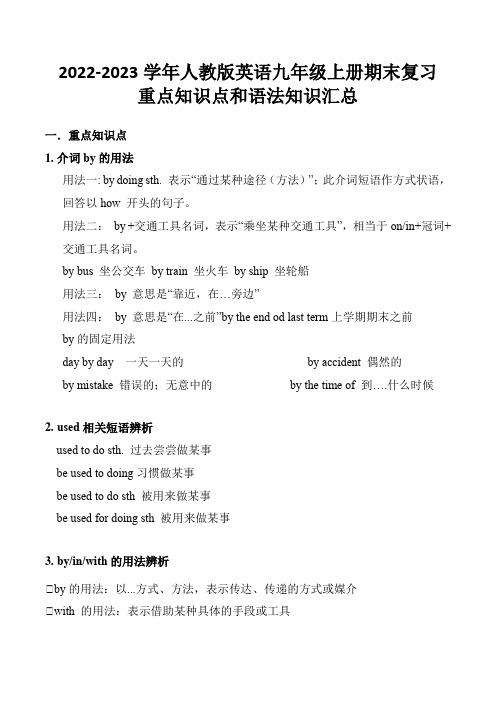
2022-2023学年人教版英语九年级上册期末复习重点知识点和语法知识汇总一.重点知识点1.介词by的用法用法一: by doing sth. 表示“通过某种途径(方法)”;此介词短语作方式状语,回答以how 开头的句子。
用法二:by +交通工具名词,表示“乘坐某种交通工具”,相当于on/in+冠词+交通工具名词。
by bus 坐公交车by train 坐火车by ship 坐轮船用法三:by 意思是“靠近,在…旁边”用法四:by 意思是“在...之前”by the end od last term上学期期末之前by的固定用法day by day 一天一天的by accident 偶然的by mistake 错误的;无意中的by the time of 到….什么时候ed相关短语辨析used to do sth. 过去尝尝做某事be used to doing习惯做某事be used to do sth 被用来做某事be used for doing sth 被用来做某事3.by/in/with的用法辨析①by的用法:以...方式、方法,表示传达、传递的方式或媒介①with 的用法:表示借助某种具体的手段或工具(1) with +工具(2)with+人体部位①in 的用法:通常与“衣着、声音、书写材料”等名称连用in+语言in English 用英语4.since与for在现在完成时态中的用法①since 其后接时间点或时态为一般过去时的句子,表示某事是从什么时候开始的①for其后接时间段,表示某事持续了多长时间5.has gone (to); has been (to); has been (in) 三者的辨析①has gone to:表示某人已去了某地,(未回来)①has been to:表示去过某地,(已回来)①has been in:表示一直呆在某地,常与时间段搭配。
6.the number of/a number of 的辨析①the number of意为“...数量”,后接名词复数,作主语时,谓语动词用单数。
(完整版)人教版九年级英语(上)知识点归纳.doc

人教版九年级英语(上)知识点归纳Unit 1 How can we become good learners? 短语总结 :1. good learners 优秀的学习者2. work with friends和朋友一起学习3. study for a test 备考4.have conversations with 与交谈5.speaking skills 口语技巧6.a little有点儿7.at first 起初起先8.the secret to......,.......的秘诀9.because of 因为10.as well也11.look up (在词典中等 )查阅;抬头看12.so that以便,为了13.the meaning of的意思14.make mistakes 犯错误15.talk to 交谈16.depend on 依靠依赖17.in common 共有的18.pay attention to注意关注19.connect with把联系。
20.for example例如21.think about 考虑22.even if即使尽管纵容23.look for 寻找24.worry about 担心担忧25.make word cards 制作单词卡片26.ask the teacher for help 向老师求助27.read aloud 大声读28.spoken english 英语口语29.give a report作报告30.word by word 一字一字地31.so that 如此以至于32.fall in love with爱上33.something interesting 有趣的事情34.take notes 记笔记35.how often 多久一次36.a lot of 许多37.the ability to do sth. 做某事的能力38.learning habits 学习习惯39.be interested in对感兴趣40.get bored 感到无聊41.be good at 在方面擅长42.be afraid of 害怕43.each other 彼此互相44.instead of代替而不是二.用法集萃1.by doing sth 通过做某事做某事是的3.finish doing sth完成某事做某事怎么样?5.try to do sth 尽力做某事近越,就越7.find it+adj+to do sth发现做某事sth 害怕做某事9.help sb (to) do sth帮助某人做某事练习做某事11.keep doing sth一直做某事怕做某事13.begin to do sth 开始做某事要做某事15.need to do sth需要做某事记得做某事17.shoot 射(射着,射死等表结果)2.it +be+adj+to do sth 4.what about doing sth?6.the +比较近, the+比较8.be afraid of doing 10.practice doing sth 12.be afraid to do sth害14.want to do sth 想16.remember to do sth 18.shoot at(瞄准)射Unit1检测题一.单项选择1.—_______ do you study English?—By listening to tapes.A. HowB. WhereC. WhenD. Why2.You can improve your English practicing more.A.byB.withC.ofD.in3.Why not practice your _________English in _________ English-speaking country?4.________conversations with others is one of the secrets to_________a successful learner.A. Practice, becomeB. Practice, becomingC. Practicing, becoming5 ---There ‘rea few new words in the article? ---What about _________in your dictionary?A. looking it upB. looking up itC. looking them up6. We ‘ ll go out to play _______ it rains tomorrow.A. soB. unlessC. because7. Can you ________which is the right answer to the question?A. look forB. findC. find out8. Jenny used to be afraid to ________in class, so she always________nothing.A. speak, talkedB. speak, saidC. say, spoke9.— Why not listen to BBC news to improve your listening skills?—It‘s ________ difficult _______ I can‘t follow. A. too; to B. so; thatC. such; that10. A good learner often thinks about ________he needs to practice more.A. thatB. whatC. how11.--I ‘mgoing to listen _______the tape. --OK. Remember to listen________the key words.A. to, toB. to ,forC. for, to12. ________or not you can learn well depends on your learning habits.13.I have finished _________my report. May I start to learn________the guitar?14.---I often make mistakes _______grammar. ---Why not ask yourteacher _______help?15. _________write down the new words in your notebook?16.---Jack used to have ________writing practice. ---Yes, and he hadlearned _________.A. a lot of, a lot ofB. a lot of, a lotC. a lot, a lot of‘ ll make.17. The more careful you are, ________mistakesyou A. fewer B. the fewer C. the less18.Good learners aren ‘afraidt _______mistakes. Instead, they learn________mistakes.19.For the first time, pay attention _________quickly to get the mainideas.A. to readB. readingC. to reading20.I discovered that listening to is the secretlanguage learning. A.something intresting, to B.interesting something, toC.something interested, ofD.interested something of21.Jenny found it very easy English well.A.learningB.to learnC.learnD.learned22.He_____ with the girl with golden hair and will soon get married____her.A. falls in love; toB. is in love; toC. loves; withD. loves; to23. My father thinks _____ is a great way to learn English.A. study grammar.B. I study grammar.C. studying grammar.D.studies grammar24 Why not ___ your teacher for help when you can ‘ t finish _____ it byyourself?A. ask; writeB. to ask; writingC. ask; writingD. asking; write25. I wonder if I can learn English well. —. All things are difficult before they are easy.A. I am afraid soB. You ‘ re slowC. It takes timeD. It ‘ s a piece of cake26 You ‘ ll find _____________ easy to learn it well. A. that B. its C. itD. this27. –I don ‘t have a partner to practice English ______________.---Why not join an English language club to practice _______________?A. /; speakingB. with; to speakC. /; to speakD. with; speaking28. ---She hardly makes mistakes _________English grammar.---No, it seems that she was born ________the ability to learn languages.A. in, withB. with, inC. in, inD. with, with二用所给单词的适当形式填空。
人教版九年级全一册各单元的重点短语及语法知识点汇总
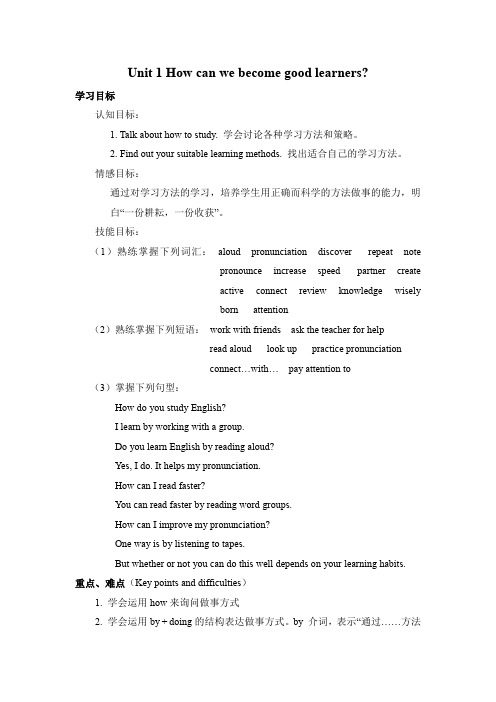
Unit 1 How can we become good learners?学习目标认知目标:1. Talk about how to study. 学会讨论各种学习方法和策略。
2. Find out your suitable learning methods. 找出适合自己的学习方法。
情感目标:通过对学习方法的学习,培养学生用正确而科学的方法做事的能力,明白“一份耕耘,一份收获”。
技能目标:(1)熟练掌握下列词汇:aloud pronunciation discover repeat notepronounce increase speed partner createactive connect review knowledge wiselyborn attention(2)熟练掌握下列短语:work with friends ask the teacher for helpread aloud look up practice pronunciationconnect…with… pay attention to (3)掌握下列句型:How do you study English?I learn by working with a group.Do you learn English by reading aloud?Yes, I do. It helps my pronunciation.How can I read faster?You can read faster by reading word groups.How can I improve my pronunciation?One way is by listening to tapes.But whether or not you can do this well depends on your learning habits.重点、难点(Key points and difficulties)1. 学会运用how来询问做事方式2. 学会运用by + doing的结构表达做事方式。
- 1、下载文档前请自行甄别文档内容的完整性,平台不提供额外的编辑、内容补充、找答案等附加服务。
- 2、"仅部分预览"的文档,不可在线预览部分如存在完整性等问题,可反馈申请退款(可完整预览的文档不适用该条件!)。
- 3、如文档侵犯您的权益,请联系客服反馈,我们会尽快为您处理(人工客服工作时间:9:00-18:30)。
人教版九年级英语上册知识点总结全集九年级英语Unit 71. tired 累的tiring 令人疲惫的bored 讨厌 boring 令人厌烦/讨厌的excited 兴奋的 exciting 令人兴奋/激动的amazed 惊讶的 amazing 令人惊讶的2. education n. 教育 educational 有教育意义的3. 想要做…:would like to do 想要…:would like sth.常用的句型有:What would you like to do?你想要做什么?I would like to visit GuiLin.我想去参观桂林。
What would you like ?你想要什么?I would like some tea.我想来些茶。
Would you like to go to my party?你来不来参加我的晚会?(表邀请) Yes, I’d love/ like to . No, thanks.Would you like some tea or coffee?你是要点茶还是咖啡?Yes, I’d love/ like. No. thanks.Where would you like to visit/ go? 你想去哪呢?(本单元的重点句型)4. go on vacation 去度假go on a trip 去旅行 go on a picnic 去野炊5. hope to do 希望做某事 I hope to go to Beijing. 我希望去北京。
hope (that) + 从句希望….I hope that I can go to Beijing.我希望我能去北京。
I hope (that) she can pass the test.我希望她能通过考试。
6. I love places where the people are friendly. 我喜欢人们友好的地方。
where 关系副词,引导定语从句where引导定语从句修饰表示地点的先行词如:the place, the city等That is the school where I studied 10 years ago.那就是我10年前所就读的学校。
7. 不定代词参看课本P141注:形容词必须放在不定代词、不定副词的后面8. consider doing考虑做某事I am considering changing my job. 我正在考虑换工作。
9. cost (sb.) 钱、时间 The book cost me 10 yuan这本书花了我10元。
10. in general 一般来说,大体上,通常11. be supposed to do 应该做…. === should 如:Scientists are supposed to know a lot. 科学家们应该知道更多。
12. take a trip 去旅行13. provide sb. with sth 供应某人某物=== provide sth for sb.如:They provide us with water.They provide water for us.14. how far 问路程多远how old 问年龄多少岁how long 问时间多久多长how often 问频率多久一次15. be away 离开如:I was away 2days ago. 我两天前离开了。
I will be away for a few days. 我将离开一些天。
16. inexpensive adj. 不贵的反义词expensive adj. 贵的17. let sb. do 让某人做某事Let me help you.让我帮你吧。
l et sb. not do 让某人不要做某Let us not laugh. 让我们不要笑了。
18. in the future 将来She will a good mother in the future. 在将来她将会是一个好妈妈。
19.用to 表示“的”有:answers to question 问题的答案 the key to the door 这扇门的钥匙20. as soon as possible 尽可能的快21. continue doing == go on doing 继续做某事如:She continued singing. == She went on singing. 她继续唱歌。
22. according to 根据23. be willing to do 愿意做某事如:I am willing to help you. 我愿意帮你。
24. on the other hands 另一方面25. hold on to sth. 保持,不要放弃Please hold on to my hand.不要放开我的手。
26. come true 实现如: My dream have come true. 我的梦实现了。
九年级英语Unit 8短语动词小结常见短语动词结构有下面几种:1.动词+副词如:give up 放弃 turn off 关掉 stay up 熬夜这种结构有时相当于及物动词,如果其宾语是代词,就必须放在动词和副词之间,如果是名词,则既可插在动词和副词之间,也可放在短语动词后。
2. 动词+介词如:listen of 听 look at 看 belong to 属于这种结构相当于及物动词,后面跟宾语。
3. 动词+副词+介词如:come up with 提出,想出 run out of 用完,耗尽4. 动词+名词(介词)如:take part in参加 catch hold of 抓住1.cheer (sb.) up 使(某人)高兴、振作如:cheer me up 使我高兴clean up 打扫 clean-up n. 打扫2. homeless adj. 无家可归的 a homeless boy 一个无家可归的男孩home n. 家3. hand out 分发 hand out bananasgive out 分发give out sth to sb. 分….给某人give up doing 放弃… give up smoking 放弃吸烟give away 赠送捐赠 give away sth. to …. give away money to kidsgive sb. sth. 给某人某东西 give me money 给我钱give sth. to sb. 给某人某东西 give money to me 给我线4. sick adj. 生病的作表语、定语ill adj. 生病的作表语,不能作定语5. volunteer to do v. 志愿效劳、主动贡献volunteer n. 志愿者6. come up with 提出想出 === think up 想出catch up with 赶上追上7. put off doing 推迟做某事 put on 穿上 (指过程) put up 张贴8. write down 写下记下9. call up 打电话 make a telephone call 打电话10. set up 成立建立The new hospital was set up in 2000. 这座医院是在2000年成立的。
11. each 每个各自的强调第一个人或事物的个别情况常与of 连用every 每个每一个的一切的则有“全体”的意思不能与of 连用12. put …to use 把…投入使用,利用They put the new machine to use. 他们把新机器投入使用13. help sb. (to) do 帮助某人做某事help him (to) studyhelp sb. with sth. 帮助某人做某事help him with English help do 帮助做某事help study14. plan to do 计划做某事plan + 从句I plan to go to Beijing. === I plan (that) I will go to Beijing. 我计划去北京。
15. spend … doing 花费…做… I spent a day visiting Beijing.我花了一天的时间去参观北京。
spend… on sth. 花费…在… I spent 3 years on English.16.not only … but (also) …不但…而且…用来连接两个并列的成分(1)引导以 not only …but (also)…开头的句子往往引起部分倒装。
因此⑴Not only do I feel good but (also)…. 是倒装句。
也是说得要把前面的句子中的助动词或者是情态动词放在主语的前面。
如:①Not only can I do it but (also) I can do best.我不仅能做到而且做得最好。
⑵Not only…but (also)…接两主语时,谓语动词随后面的主语人称和数的变化也就是就近原则如:①Not only Lily but (also) you like cat. 不仅莉莉而且你也喜欢猫。
②Not only you but (also) Lily likes cat. 不仅你而且莉莉喜欢猫。
常见的就近原则的结构有:Neither… nor…即不…也不… (两者都不)Neither you nor I like him. 我和你都不喜欢他。
Either… or…不是…就是… (两者中的一个)Either Lily or you are a student.Not only …but (also)…There be17. join 参加(指参加团体、组织) 如:join the Party 入党take part in 参加 (指参加活动)如:take part in sports meeting 参加运动会18. ①run out of == use up 用完用尽I have run out of money.== I have used up money. 我已经用完了钱。
②run away 逃跑 The monkey has run away from the zoo. 这只猴子已经从动物园里逃跑了。
③run to + 地方跑到某地19. take after (在外貌、性格等方面)与(父母等)相像be similar to 与..相像take after 相像look after 照顾 take care of 照顾20. work out 算出结局The situation worked out quite well. 情况的结局非常好 Have you worked out this math problem? 你已经算出这道数学问题了吗?21. hang out 闲荡闲逛I like to hang out at mall with my friends. 我喜欢和我的朋友一起去购物中心闲荡。
